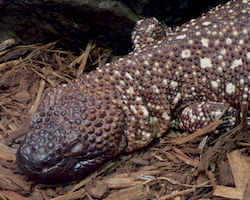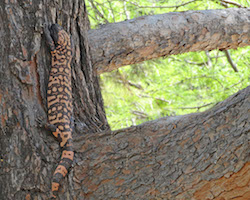Can Gila monsters climb trees?
Great question about one of my favorite lizards! But before we answer that, let's review a little bit about these amazing creatures.
What is a Gila monster?

Gila monster coloration acts as a warning close up. Image by Karla Moeller.
Gila monsters are one of the largest lizards in North America, and one of only two truly venomous lizards that we know of. Their orange and black coloration warns potential predators of that venom, but also helps them blend into the shade of bushes and trees. Gila monsters live in the American southwest, mainly in the Sonoran Desert. There, they feed on young animals that nest on or below ground. This includes small lizard eggs (for juvenile Gilas), the eggs of ground-nesting birds, like quail, as well as young rats, mice, and even tiny young rabbits. And when they eat, they eat BIG. Sometimes, Gilas might eat more than a quarter of their own body mass in just one meal!
These colorful lizards have very low energy needs, and can store a lot of fat in their tails, helping them get through seasons that are too cold or hot to be very active. They are also good at storing water. Gila monsters can actually use their bladders as a water bottle. They can fill up on rainwater in the spring, then hold and pull from that water throughout the summer to help survive the annual dry season. So now that we know some basics, let's get back to your main question:
Can Gila monsters climb trees?
The short answer is: yes. Gila monsters are actually pretty good climbers. But here we get into an interesting difference between what an animal CAN do versus what it usually DOES. Gila monsters have long claws that they mainly use to dig for food (like buried eggs), or sometimes to modify burrows (they don't dig their own burrows). They can also use these claws to climb up trees when necessary.
The video above shows a Gila monster climbing up a tree, and then back down. While it is interesting to see, climbing trees is not a common behavior for Gila monsters. The animal in this video accidentally wandered into a situation it suddenly realized could be dangerous. To get away from that danger, it decided to climb the nearest tree.
Do Gila monsters climb trees?
So, how often does this happen? (Or in other words, is this a behavior Gilas actually use regularly?) Well, there are only a handful of recorded observations of Gila monsters climbing trees. So in general, they likely don't climb trees much. Mostly, the times they've been observed climbing, they were trying to escape potential predators (like humans, as shown in the video). There is also one observation of a Gila that might have been climbing up to a low tree branch so that it could cool off a bit, as the ground was very warm.
"But wait," you might be thinking... "I've seen other pictures of big Gila monsters climbing trees." Well... not exactly. Most likely, what you saw in those pictures was one of the Gila monster's closest evolutionary cousins, a beaded lizard.
Beaded lizards climb trees... a lot!

A beaded lizard with its eyes closed. Notice how much darker beaded lizards are compared to Gila monsters. Image by TimVickers.
Beaded lizards look very similar to Gila monsters, but have much darker coloration that usually lacks the stripes, and they are much larger. They live in Mexico and Central America. They are the only other venomous lizard, and are a bit more feisty than Gilas. Beaded lizards have very long tails and extra long claws, both of which help them be spectacular climbers. They spend a lot of time up in trees, often looking for bird nests which hold one of their favorite meals—eggs or young birds. Though Gila monsters are found in one area of Mexico that also has Mexican beaded lizards, it's unlikely that you'll confuse the two once you've seen them in real life.
And if you do ever see any of these animals in real life, make sure to give them a lot of space and never try to handle them. Gila monsters and beaded lizards are great at defending themselves, with their sharp teeth and powerful venom. And if you ever get to see either climbing a tree (which is far more likely for beaded lizards), just watch from a distance and be thankful you were in the right place at the right time.
Learn more about the lives of Gila monsters in our story, Hardy Gilas.
Have a different answer or more to add to this one? Send it to us.
View Citation
Be Part of
Ask A Biologist
By volunteering, or simply sending us feedback on the site. Scientists, teachers, writers, illustrators, and translators are all important to the program. If you are interested in helping with the website we have a Volunteers page to get the process started.








